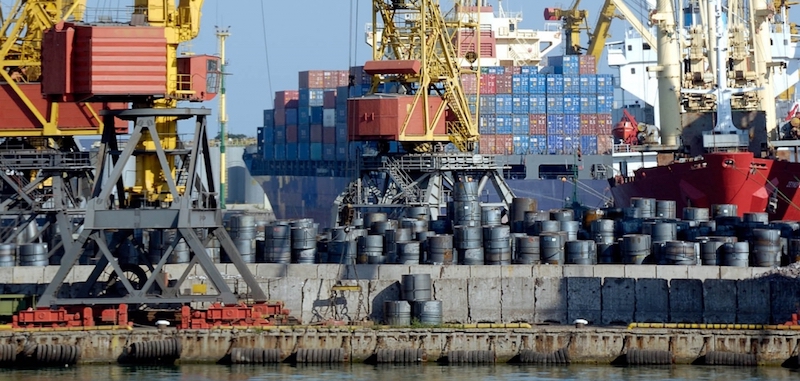This week, U.S. Sen. Jeff Merkley, D-Ore., introduced the Climate Smart Ports Act of 2020 — legislation to create a $1 billion per year federal program dedicated to improving sustainability measures throughout U.S. ports. The legislation has also been introduced in the U.S. House by Rep. Nanette Diaz Barragn, D-Calif.
The bill would assist ports and port users by replacing cargo handling equipment, port harbor craft, cargo delivery trucks, and more with zero emissions equipment and technology. The bill would also help ports develop onsite clean energy microgrids to power their facilities and equipment, and authorizes an additional $50 million per year for the Diesel Emissions Reduction Act (DERA) to be spent specifically on reducing port emissions.
“This commonsense legislation is a win-win-win — helping marginalized communities breathe cleaner air, protecting our planet for generations to come, and creating reliable, high-paying jobs for our workers,” said Merkley, who is a member of the Senate Environmental Justice Caucus. “I’m pleased to be teaming up with Congresswoman Barragn in urging our colleagues to stand up for environmental justice, climate action, and job creation by making our ports stronger and more sustainable.”
“Ports are job creators, but also major sources of air pollution with serious public health consequences, particularly for the communities of color that tend to live nearby," Barragán said. "The people in these neighborhoods live close to working diesel trucks, ships, trains, and cargo-handling equipment spewing poisons into our air and water. And we’ve paid the price. By greening our ports, we can tackle this environmental injustice. We are often given a false choice between a clean, healthy environment and a strong economy. With the Climate Smart Ports Act, we don’t have to choose.”
The introduction comes amid projections that greenhouse gas pollution from ocean vessels at sea, as well as mobile sources at ports, are on the rise. The legislation would help reduce those emissions by helping ports overcome upfront costs of truck, cargo equipment and train upgrades, and will create new, good paying jobs in the process. Specifically, the bill will require payment of a local prevailing wage for work performed with federal funds, encourage project labor agreements and local hiring, give preference to equipment produced in the United States, and includes language protecting dock workers from automation.
Nearly 40% of Americans live within three miles of a port, and many of these communities are low income communities and communities of color that have to deal with high-emitting diesel trucks, ships, trains, and cargo handling equipment. To ensure that money in this program finds its way to communities that need it the most, the bill sets aside a minimum of 25% of funding for areas in non-attainment with Clean Air Act criteria pollutants. In addition, applications for grant funding are scored in part on how they will reduce public health disparities in communities and reduce toxic air pollution.
The legislation is endorsed by the International Longshore and Warehouse Union (ILWU), Moving Forward Network, Earthjustice, Natural Resources Defense Council, Sierra Club, League of Conservation Voters, Environmental Defense Fund, Food & Water Action, Greenpeace, Eastyard Communities for Environmental Justice, Friends of the Earth, Jobs to Move America CA, the American Lung Association, Indivisible San Pedro, the San Pedro & Peninsula Homeowners Coalition, Green For All, Union of Concerned Scientists, by Humankind, Oregon Public Ports Association (OPPA), International Port of Coos Bay, and the Port of Portland.




